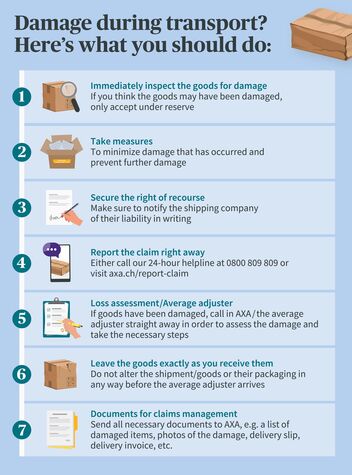
Coverage against transport loss / damage: your guide to the seamless transport of goods
Nowadays all kinds of goods are being shipped all over the world – by sea, by land and by air. But what happens if something goes wrong during shipping? Who is liable for the resulting loss or damage? We’ll tell you all you need to know about transport loss / damage and show you the best way to protect your company.
In Switzerland alone, an astounding 27.8 billion ton kilometers of goods were transported by road and rail in 2021. Given this immense flow of goods, it's hardly surprising that problems arise from time to time. A delivery that has gone missing or has been damaged or stolen can quickly wreak havoc on supply and production chains and become a financial nightmare for the company.
When this happens, the burning question is: Who is responsible and what’s the best way to protect your company?
Who is liable for transport loss or damage?
If something goes wrong while your goods are being shipped, in theory the freight company is the one responsible – but not always. The legal bases and terms of liability vary depending on the means of transport and the country of destination.
Companies can't really be expected to review the liability limits of individual carriers and to initiate the corresponding negotiations if damage occurs during transit. Marco Gämperle, Head of Transportation Insurance Claims at AXA, explains, “Freight companies often simply fail to write back or deny liability, especially when a small business contacts a major delivery company on the other side of the world.”
What liability limits apply to freight carriers and courier services?
In Switzerland, the liability of domestic forwarders, freight carriers, couriers or other shipping companies is defined in the Swiss Code of Obligations. However, these statutory provisions can be contractually modified. For example, it is standard practice to put a limit on the amount of indemnification.
“Typically, delivery companies only provide compensation per kilogram rather than for the entire value of the package,” explains Marco Gämperle. This also applies to the Swiss Post. Packages are compensated based on their weight and not on their value.
The guidelines for liability also vary from country to country and depending on the type of transport and type of shipment.
It all starts here: uninterrupted supply chains
Based in Cham, Neutromedics (in german) is a company specialized in shipping highly sensitive medical products such as human body implants like bones, tendons and nerves. Over 5,000 packages are shipped every year. And each one must be packed in dry ice to maintain a glacial minus 80 degrees Centigrade. The special nature of these good requires extreme precision during transport. Although most shipments go off without a hitch, sometimes things do go wrong. This is where AXA’s cargo insurance comes into play. Not only does it pay for the claim, it also assists shippers with complex negotiations with freight companies. Bea Schnitzer, Head of Administration at Neutromedics AG, and Marco Gämperle, Head of Transportation Insurance Claims at AXA Switzerland, talk about the challenges of shipping goods and how companies can protect themselves against loss and damage of their goods.
Read more in the 3/2023 issue of our customer magazine My Company (in german)
Your lifeline in case of loss or damage during transport: transportation insurance
Cargo insurance covers all damage that is caused to goods so companies are protected against logistics risks. Marco Gämperle describes cargo insurance from AXA like this: “You can think of it much in the same way as comprehensive accidental damage insurance. If something happens to a package in transit, we pay our customers for the damage right away, regardless of whether the goods are being transported from Cham to Bern or from New York to Paris.”
What does transportation insurance cover?
Cargo insurance covers the loss of or damage to products during transport, from the place of dispatch to the place of delivery. The insurance reimburses the damage and then contacts the party responsible for the damage during transport, e.g. the forwarding agent, freight carrier or a courier service, to reclaim compensation from them.
Companies can also take out supplemental coverage for business interruptions due to goods that were delivered damaged or not delivered at all, and get help if they are not able to make their delivery deadline due to delays or loss / damage of the ordered goods.
Who should have transportation insurance?
Having sufficient coverage is a good idea for all companies in manufacturing and retail that regularly ship packages or larger shipments and want to avoid the risks of loss or damage.
Companies have as many different kinds of needs as there are types of goods to be shipped. Transportation insurance takes all of these into account with customized solutions. Marco Gämperle and his team put together packages that precisely meet their customers' needs. “The sheer variety of goods that are shipped is mind boggling. And we offer different coverages to insure these different types of goods” he explains.
What to do if you experience loss or damage during transport
In order to help your insurer do the best job they can, here’s what you should do if something goes wrong:

Avoid transport losses and damage: 5 tips for sending packages
1. Use appropriate packaging
The right interior and exterior packaging protects the shipped goods against rough handling. Choose quality packaging materials even if this means paying more for shipping. And neutral packaging materials deter theft.
2. Choose your shipping service carefully
Look for quality when selecting a shipping partner (in german). The following services are a good indication:
- Personal consultation
- Transparent tracking system
- Adaptable delivery terms
With transportation insurance from AXA, we will help you find the best shipping partner for your needs.
3. Check out subcontractors
Clarify beforehand whether the shipping company will be handling the job itself or subcontracting it out. Only agree to the subcontractors hired by the shipping company after you have checked up on their credentials.
4. Inspect goods
Check goods on shipment and delivery, preferably against signature.
5. Take out transportation insurance
Protect yourself with cargo insurance. Make sure to check the General Insurance Conditions to see if both the deductible per item shipped as well as the maximum limit per means of transport are adequate. You should also run a cost / benefits analysis and remain in contact with the insurer in case they intend to waive recourse.






